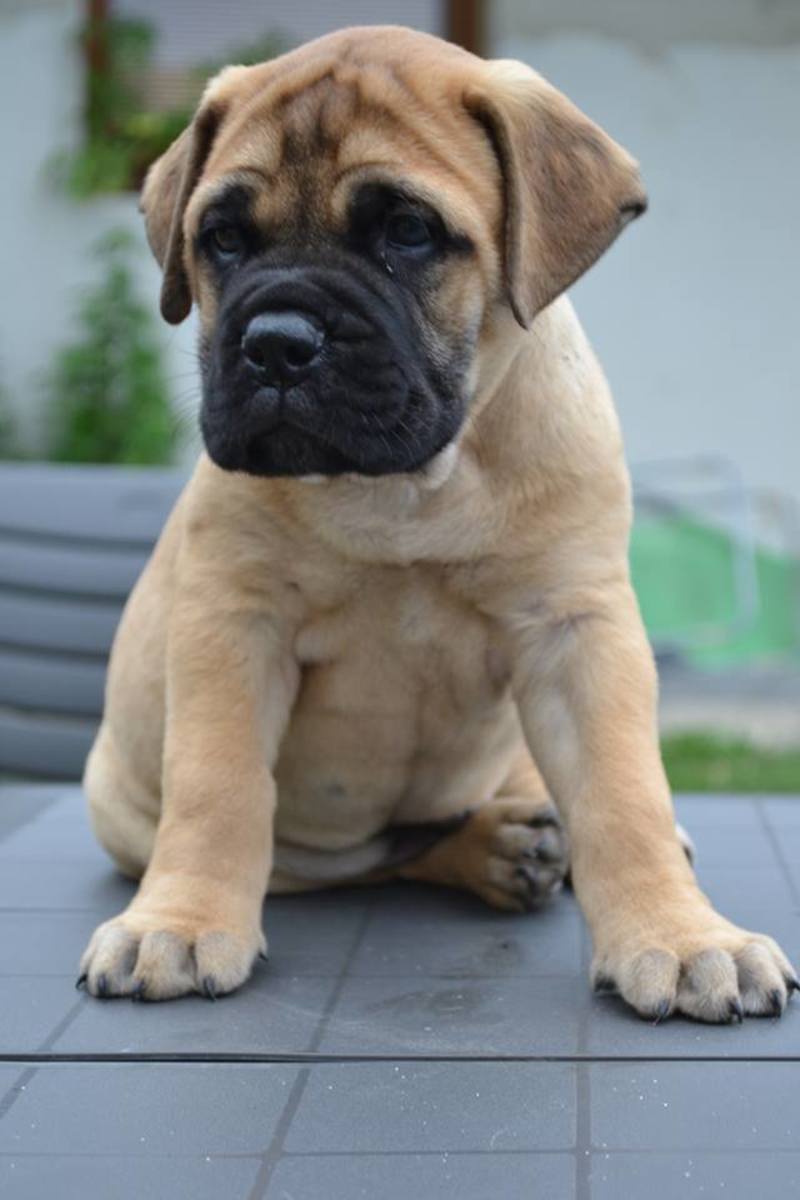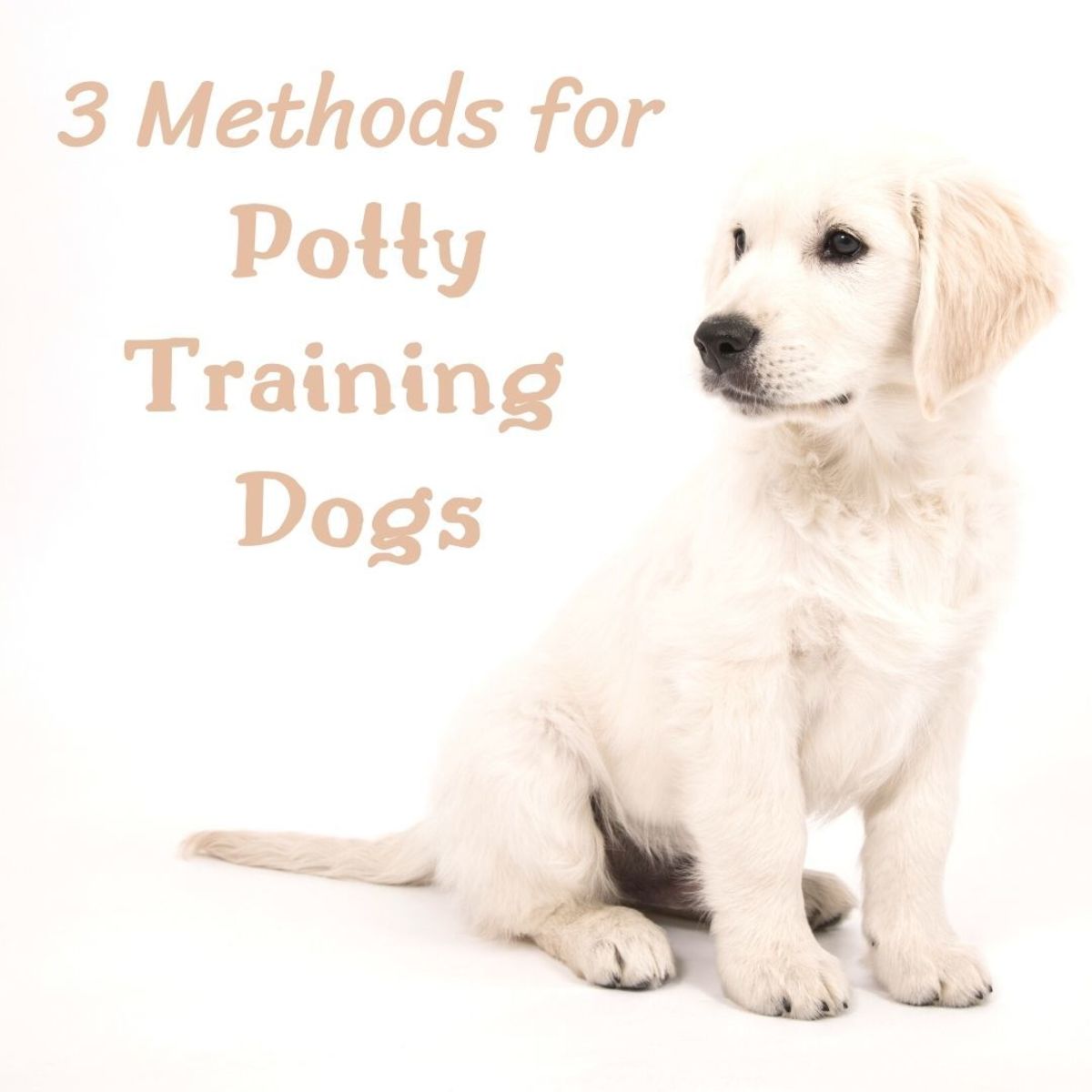- HubPages»
- Pets and Animals»
- Dogs & Dog Breeds»
- Dog Training
Housebreak Your Puppy - A Trainers Advice
There are almost as many theories on housebreaking as there are breeds of puppies. Personally, I can’t imagine why since it’s not all that complicated. It requires far more determination and stick-to-itiveness than any kind of educated plan or newfangled theory. Housebreaking can be very difficult, or it can be very easy. Mother dogs have Den-broken their pups for millennia. When puppies were born in the wild they relieve themselves in the den just like they do in our homes. But the mother cleans up after them so well that the scent is never detected by the puppies again. In a few weeks, their mother has taught them by example that they need to go outside the den when they need to go. The circumstances are quite similar as we begin teaching the pups and we often manage to teach them just as quickly as their mother. Often, but not always. When we’re not so lucky, our problem is usually because we try to teach them with negative reinforcement. A concept mommy dogs don’t use until adolescence, and sparingly even then, with a growl, a snap or a nudge.
I’ve housebroken quite a few pups and even a two year old adult who was adopted even though he had lost his bladder control after a very stressful puppyhood and rough stretch lost in the forest during the California fires of 2007. Recently, I’ve housebroken another young pup and with any luck, I should be able to pass on a fresh perspective on housebreaking and hopefully some healthy bonding with your puppy.
To keep your sanity and your composure intact remember that one thing is certain. You are going to housebreak your puppy. It’s going to happen. The question is how difficult will it be, how long will it take, and will your carpet, furniture and sanity survive? Hopefully you began the housebreaking process as soon as you brought your puppy home. If not, desperation has brought you here, so let’s get started.
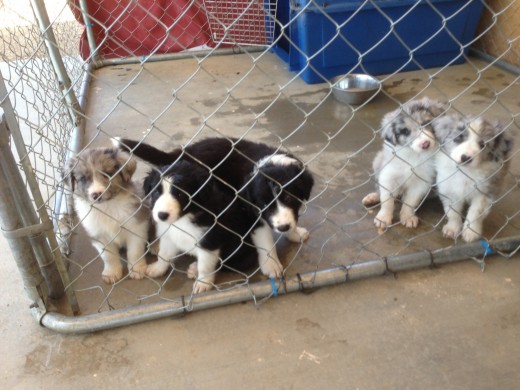
A Note on a Puppies Natural “Hold it” Capabilities
A puppy is not physically able to control the muscles that enable them to “hold it” until he (or she) is about 10-12 weeks old. Until this time, your housebreaking efforts are not going to be completely successful, so don’t feel like you’re a failure just yet if you and your pup have been struggling so far. Up to this point the best you are going to do is to set up a runway from the crate to outside, and make sure you have plenty of effective carpet or tile cleaner with pet odor neutralizers.
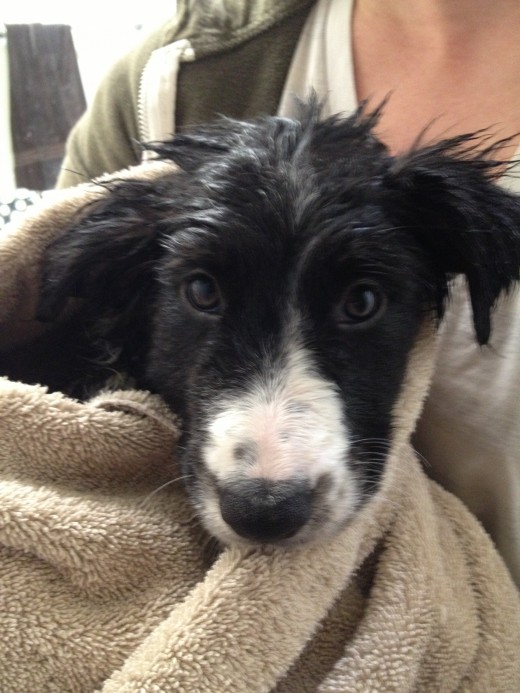
Make Sure Your Puppy is Healthy
Before you begin you want to make sure that your pup is healthy. If you’ve done your job as an owner, you’ve taken steps to make sure that your dog has received the proper shots and deworming’s. Normally you want to take your puppy or adopted dog to a vet within 48 hours of his coming home from the breeder or shelter. If you haven’t begun this process, you will need to get to it now. If there’s anything that can cause a giant step back in housebreaking it’s a bout with worms, parasites or a bladder infection. A fecal check will quickly determine if your new best friend has a problem and this will give you an opportunity to get ahead of the worm problem with regular worm prevention treatments. The vet should also make sure there are no fleas present. In addition to making you and your dog miserable, fleas can cause tapeworm.
Feed Them Only High Quality Dry Puppy Food
This is the most important time in your dog’s life in terms of future health and you will want to start your pup off with the best premium puppy food (kibble) you can provide. Preferably a high protein, low or no-grain dry formula. High protein dry food is usually best. In addition to making his bowel movements regular and firm, it will also maintain maximum growth and healthy fur. There is the occasional exception so you need to research your dogs breed to make sure there are no warnings with regard to high protein food. This is rare but breeds that are prone to hip dysplasia or other genetic growth defects, may require low protein food to control rapid growth and prevent the development of the disease.
Try to maintain the same food and feeding schedule throughout the housebreaking process, but if you do need to change food for any reason, you will need to gradually make that transition. Mix 1/3 of the new food into the old food the first day, then ½ the second and third days. Maintain half and half for two days, then 2/3 new food to 1/3 the previous for two more days before going off the old food completely. You will know if the new food is working out by your puppy’s regularity and the firmness of the feces. Canned food is not recommended under any circumstances. Canned food loosens stools significantly, making it much harder to housebreak them.
How Important is Crate Training?
It might seem cruel to some but crate training is the most natural and efficient way to housetrain a puppy and begin the training process in general. The crate is exactly like the mothers den and the closest thing to natural dog home to anything else in the human world. When your puppy arrives in your home he doesn’t see your entire house as living quarters like we do. When you crate your dog, he does see the crate as his safe and secure living quarters, he will avoid defecating in his living quarters at all costs. This is a very convenient instinct for us. Since most puppies will be at least 6 weeks and usually 12 weeks or old when they are taken from their mother, they nearly always have the strong instinct to never relieve themselves in their crate.
If at some point you or another family member crates the puppy too long and he goes in his crate, it simply wasn’t his fault! This is the last thing a puppy wants to do and he would have to be utterly miserable to do so! Puppies under 6 months old should never be crated longer than 3 or 4 hours. They simply cannot hold their bowels or their bladder that long. Larger breed puppies can go a little longer at nighttime when you, and they, are sleeping. Although don’t push your luck too much. This is a baby dog. How many times would a baby human require you to get up during the night? Only crate your dog until he is housebroken and you can trust him not to destroy your house. At this point, the crate should be his place of refuge, where he goes voluntarily. How long to keep the crate is arguable. Some vets say until they are a year old, other say you can dispose of it as soon as they are housetrained. When dealing with a little ones psyche, I prefer to stay one the safe side and wait until the year is up.
DO NOT use the crate as a punishment, although it is ok to send your pup to the crate for a short “timeout” to settle him down. The time in the crate needs to be balanced with sufficient time walking, playing and bonding with you and your family. Excessive periods of isolation without this balanced time will lead to behavioral problems like hyperactivity, destructive activities, digging, chewing, excessive barking and even biting and self-mutilation.
When your dog is not crated indoors you need to keep him with you and watch him constantly. Your goal now is to teach him that the whole house is his living quarters. Once he starts going in the house, you are re-training rather than training. Don’t be disappointed when it happens, because it will, but the best thing you can do at this point is to leave him in his crate when you cannot watch him. When you take him out of the crate, make a point to always take him directly outside where you want him to relieve himself. DIRECTLY. Not a few minutes after. Regardless of how long your pup has been in the crate, this needs to become a ritual whenever you let him out.
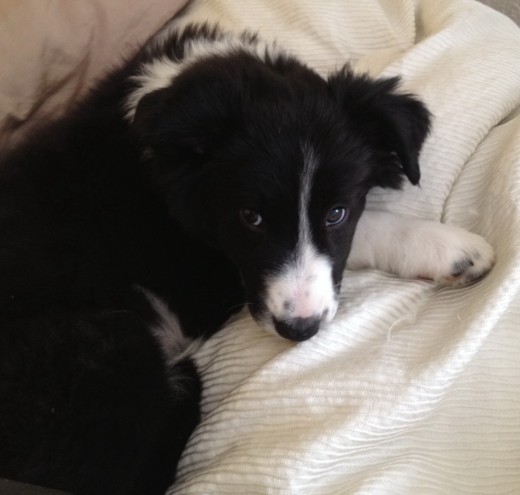
Supervision is the Key
Hopefully you have begun the training process by crating your puppy and now know from experience that it’s extremely unlikely that your puppy will relieve himself in his crate. It only takes a second for your pup to have an accident and often it will be when you’re looking away. You will need to watch carefully for the signs that your puppy needs to eliminate. Sniffing the floor, circling while sniffing the floor, and running out of your sight suddenly, are telltale signs that your pup is about to go! When you see this behavior, take your puppy outside to where you want him to eliminate and stay with him. If your pup gets distracted and doesn’t go right away, take him for a walk and most importantly, don’t take him home until he goes. I stood on the patio one rainy night for an hour and a half, only for him to start going as soon as we entered the house! So be patient. It won’t take long before you have a good idea when he has to go.
Establish Regular Habits and Routines
You will need to set up a set schedule of crating, feeding, walking, playing/exercising, et cetera. Just as with children, setting up a set schedule will make potty-training easier and ultimately make your puppy smarter. Young pups minds learn patterning based on activity and schedule. Regular activity on this schedule will develop their minds and helps them know when its potty-time. This reminds me, you will need a trigger phrase or word like “go potty”, “do business”, “poopy-time”, “release the Krakin”, or something appropriate. Actually short, simple, single words are what they will actually learn in combination with a hand signal and tone of voice. Pointing toward grass and calmly saying something like go-potty will work best.
When organizing the schedule, it’s important to keep in mind that it is for your pup’s bodily functions, rather than your own convenience, which is more easily said than done. But hopefully you can find some mutually agreeable arrangement. It’s good to keep a journal, or at the very least keep track of the times that your puppy eliminates for the first few days. Then adjust the schedule accordingly.
Finally, Getting the Pup to Go Potty Outside!
After meals will be the easiest, because all puppies will want to eliminate 5-30 minutes after eating. Early on you should take them outside to the same area every time. Dogs are triggered to eliminate by a familiar scent, usually their own or another dogs urine or scent. This should be established in a place where they feel safe and secure, without common distractions. When your puppy does go outside or where you want him to go, make a big deal out of it and praise him lavishly, and even give him a treat. It’s important that you bestow this praise immediately. Delayed praise is useless with puppies or dogs in general for that matter.
If your pup doesn’t go right away, you need to be prepared to stay out with him until he goes. This usually only takes a few minutes but it could take as long as several hours. If you must return home before your puppy has taken care of business, you will want to crate him as soon as you arrive home and continue taking him outside every 15-30 minutes until he does his business. IF you don’t, keep the mop handy. But with a consistent schedule, you can reduce the amount of potential accidents from the very beginning. Consistency is the key.
When Your Puppy Has an Accident
When your pup does have an accident, don’t have a fit and scold your dog. You don’t want to create a negative association with your pup’s natural behavior and bodily functions. Quietly remove your dog to the place where you want them to go, so they continue to establish the association. You don’t want your pup to be caught between instinct and waiting until they are outside where you are training them to go.
The Other Reason you need to Neutralize Puppy-pee Odor
Make sure that you clean up the accident well so that no scent remains. You will need a pet odor neutralizer, as urine isn’t easily neutralized with the usual cleaners. If you do use regular cleaners, try to avoid ammonia-based cleaners since ammonia breaks down to urea, a component of urine.
How Often do Puppy’s Need to Go?
As mentioned, Puppies will need to urinate 5-30 minutes after they eat. They will also need to go a few minutes after they drink, play, chew, or sleep. For most pups over 10 weeks old, this will add up to roughly 5 to 10 times a day. As they get older and into adolescents from 6 to 11 months old they will require 4 to 6 walks a day, depending on the breed. Generally, larger breeds have larger bladders and often need to go much less often than smaller dogs and visa-versa. Although, until about 4 months they will all need the same schedule. Learning about your dogs breed can be very important because most breeds have numerous idiosyncrasies that owners need to know about.
Limit Access to Potential Secret Potty Spots
When it comes to eliminating, puppies can become quite resourceful. Once they get the idea that there are times and places to go, but before they are clear on where and when, they will often begin to sneak off and find “secret spots”. When your puppy suddenly runs out of the room, or even to the other side of the room where you cannot see him, he may be on the hunt for a “secret spot” to take a quick pee or drop a couple bonbons. This is another reason why constant supervision is so important in getting ahead of this housebreaking process. It’s a good idea to close the doors to other rooms and even close the door behind you, so your puppy can’t slip off for a quickie.
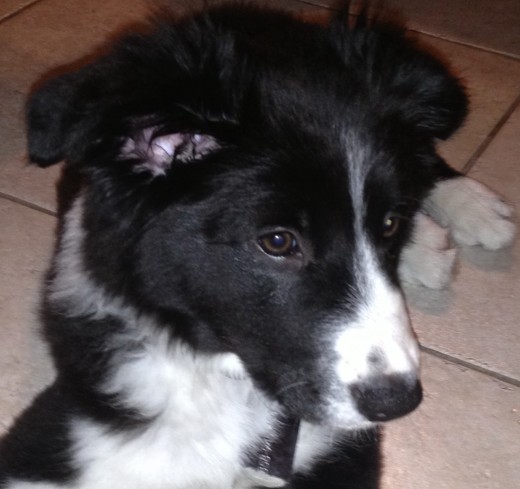
Food and Water Tips
You don’t want to leave the food bowl out even if your pooch doesn’t finish his meal. Most puppies are going to want to do “number two” right after eating, regardless of how much they eat. You’re asking for accidents if you leave the bowl out half full. After they go out, they will come back, eat some more and go again! If they run off after eating but don’t finish the meal, take up the bowl anyway. It won’t take more than twice for them to learn that they need to finish or it won’t be there when they return. There are actually several other reasons for this that I will get to in my next piece on training… stay tuned.
Similarly, it’s generally a good idea to remove your pup’s water bowl after 9 PM, or a couple hours before bedtime, unless the weather conditions are unusually dry. Might not be such good of advice if you live in Arizona and it’s the middle of summer. But under normal conditions, you’re not going to dehydrate your pup by not allowing him to drink right before bedtime.
If your dog becomes ill and develops diarrhea, extremely loose or liquid stools or has been throwing up more than once in a 12 hour period, you should not expect your dog to maintain housetraining success. You don’t want to stop or interrupt the schedule, but you should get your dog to your vet as soon as possible. Pups and even some adult dogs will throw up for no apparent reason from time to time. It’s often nothing to worry about unless you see other symptoms, like worms in the excrement, or the vomiting repeats within 12 hours.
Late Discipline is Useless
Just as in praise, so goes punishment. This seems like one of those common-sense things that everyone seems to realize, but they still do it anyway! Please don’t discipline your dog (or puppy) after-the-fact for having an accident that you did not witness. In fact, even if you see your puppy eliminates on the floor, verbal or physical punishment doesn’t seem to have any effect on future behavior. It’s been established in several studies that negative reinforcement used on puppies has been proven to do more behavioral harm than good. Punishing your dog sometime after the incident, for something you didn’t see him do, won’t do any good at all.
Never Discipline for Excitement Urination!
At least for me, this is another common-sense issue. Excitement Urination or Submissive Urination is when your puppy begins peeing or leaking uncontrollably from becoming over excited about new visitors, someone making over him in a loud or excited voice, animated movements, verbal scolding’s and other excitable or stressful situations. When a puppy gets excited and begins piddling all over, it is completely uncontrollable and usually the puppy isn’t even aware that he’s doing it! NEVER punish a puppy for this completely uncontrollable behavior! The last thing a puppy wants is to get pee on himself, yet when this reaction happens they pee on themselves along with anything and everything around and under them. If you’ve ever seen it happen, it’s very easy to tell that the dog is completely unaware of it, until someone yells “he’s peeing on me!”, then they seem to become visibly embarrassed, but no less excited. Excitement urination is very common in puppies, and perhaps even more common in certain more nervous breeds.
Your Energy Can Have an Effect on Your Dogs Success
This might sound mystic and new age but your energy, attitude and demeanor can have a notable effect on your dog in many ways. And today this is more than just a theory. You’ve probably heard of Cesar Milan, known as the Dog Whisperer, a hit series on the National Geographic Channel. While I somewhat agree with critics that Mr. Milan’s view of the social structure of dogs is somewhat simplified, there is little doubt that he is an excellent trainer and his TV show has done more than most critics realize for dogs and their families worldwide. Cesar constantly talks about how important our energy is when working with dogs and I couldn’t agree more. If you have ever known one of those people who had this “thing” with dogs, or animals in general, you’ve observed how it is much more than their behavior and it can only be explained by the energy they give off that is easily detected by dogs and other animals.
Dogs are the most forgiving animals on earth and they will probably be crazy about you regardless of all the mistakes you might make. However, the energy level that you establish with your dog can make housebreaking, training and your relationship in general, much easier. If you have a stressful attitude and get discouraged or angry when your pup has an accident, your pup will become nervous and stressed as well, which can not only make housebreaking and training a more difficult process, but can cause your long term relationship to be potentially less joyful than it could have been.
On the other hand, if you treat your dog like a human and/or like some royal deity, you are most certainly spoiling the dog and potentially putting him in danger. Although there are many reasons not to treat your dog as a human, one of the worst case scenarios is losing their owners for any reason. Should something happen to you, should your dog become lost for any reason and need to behave and get along with other people, children, or other animals, by being spoiled and only loyal to you, your dog would not be prepared for this experience. A variety of dogs arrive at Shelters and Animal Welfare centers everywhere from royal lives that have made them incompatible with any other owner. More often than not, their fate is sealed.
Housebreaking can be a lot less difficult by simply getting your new dog on a schedule and sticking with it, cleaning up efficiently and being patient and consistent. It’s the natural and uncomplicated process of teaching your new best friend how to behave in his new home. Don’t let it be a difficult, stressful time that might negatively affect your new dog’s happy puppyhood. While your puppies growing up and learning about the rules of your home and your family, making it a memorable time requires a relatively short investment of time and patience to establishing a magical relationship that you will have for years to come.
Are you ready to housebreak your puppy?
view quiz statistics© 2014 Steve Garton

